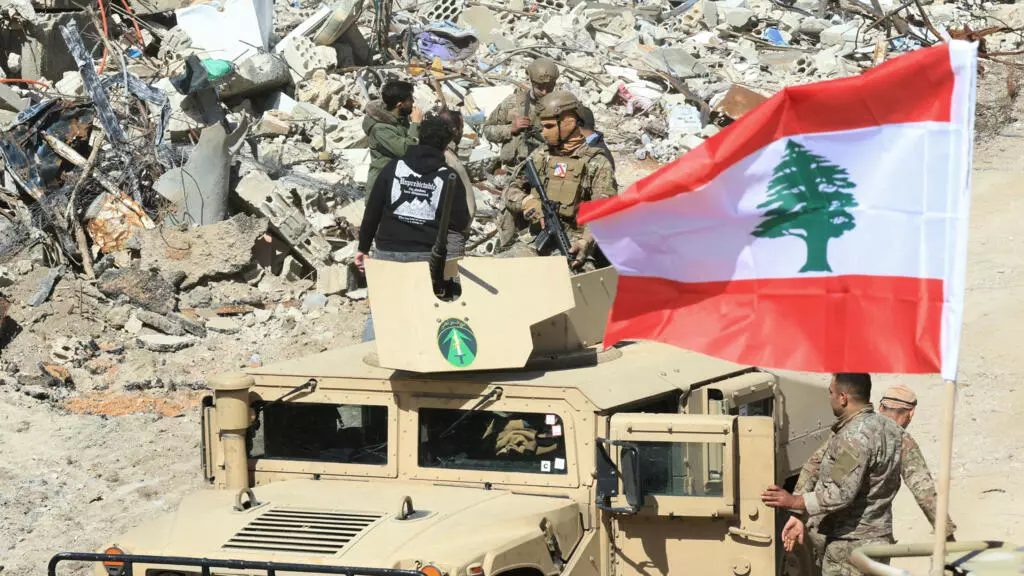Fear, Violence, and Lebanon’s Collapse of Moral Order
Lebanese army troops patrol the destroyed southern border village of Adaisseh, following the Israeli forces withdrawal on February 18, 2025. Photograph credit: Mahmoud Zayyat / AFP.
As an academic and editor who regularly follows news and interviews from the Arab world, I am often struck by a recurring line of reasoning in discussions of the Arab-Israeli conflict: Israel, some argue, does not need a reason to attack, because aggression is inherent to its nature.
This memory came back to me while reading Marwan Harb’s recent article in Al Modon, “Preventive Killing: No One Is Innocent.”* Harb reflects on the erosion of “innocence” amid cycles of violence, where killing has shifted from deliberate to indiscriminate. He captures it most sharply when he claims, “what links the cycles of violence in our region is something more dangerous than mere killing: the idea that innocence itself is no longer a moral shield.” The civilian is no longer a “potential victim” but a “postponed killer.” Crimes need no justification. It is enough to imagine the victim’s intent or affiliation to open fire — acts sanctioned by fear and tribal instinct.
Harb situates this within Lebanon’s experience of violence, which he terms “an era of brutality.” Crime has become a way of preempting the future. The preemptive strike, once a strategic military doctrine taught in colleges, used by states to justify wars under the guise of preventing danger, has become central to a new political theology. The human being — body, language, geography, identity — has become a legitimate target. No longer seen as worthy of protection, he is instead treated as a threat to be eliminated. Whoever is not born innocent is born suspect.
Harb’s critique is both philosophical and political. The tragedy, he suggests, is that innocence no longer protects anyone from brutality. This reality is underscored by the daily loss of life in Lebanon and across parts of the Arab world, where victims are denied even the dignity of being recognized as victims. Terms like "identity-based killing" have become widely recognized since Lebanon's Civil War (1975-1990). Although many Lebanese believe this criminal practice ended with the civil war, recent events have shown they are mistaken.
Language, Harb argues, plays a decisive role in normalizing violence. Phrases such as “they are not civilians” or “terrorist wombs” symbolically strip entire communities of humanity. Once dehumanized, these groups can be more easily targeted, as fear and ritualized aggression replace notions of justice, rights, or national belonging.
Here, Harb invokes Hannah Arendt’s concept of the “banality of evil.” Arendt’s “banality of evil” sheds light on how violence in the Arab world can be normalized and routinized through bureaucracy, language, and conformity. Arendt’s analysis of Adolf Eichmann — who appeared not as a monstrous fanatic but as an ordinary, unimaginative bureaucrat — showed how mass violence can be enabled by routine obedience and bureaucratic logic. This logic echoes in Lebanon; dissenters are easily accused of treason, particularly when opposing Hezbollah and its allies. Suspicion is generalized. No one is regarded as innocent. The fact that many regimes in the Arab world rely on state security agencies, intelligence apparatuses, and rigid bureaucracies to perpetuate repression lends support to how bureaucracies perpetuate violence in the Arab world. As Harb notes (and as cited by Arendt above), violence is preceded by linguistic framing. Calling civilians “terrorist incubators” or “traitors” strips them of protection and makes their killing seem permissible.
Although there are frequent references to the "banality of evil" in the Arab discourse, caution is necessary when making this comparison. A major difference is the historical context of violence in Germany, which involved an industrial-scale extermination effort. Another key distinction is the role of ideology. Even Eichmann, who did not have strong ideological beliefs, contrasts with much of the violence in the Arab world, which is often openly justified through ideologies like sectarianism, nationalism, or militant Islamism.
Still, Arendt’s work on Eichmann was criticized by Jewish intellectuals and Holocaust survivors, who challenged her portrayal of Eichmann as merely ordinary. Yet her warning remains: when communities normalize suspicion and violence, individuals cease being neutral and civilians lose their protection.
Lebanon reflects this paradox of modernity as a society that calls itself “civilized” yet slides into violence. Violence is rationalized as self-defense, but in practice, it becomes ritualized and indiscriminate, enabled by advanced technology and bureaucratic structures. Civilization, in this sense, is not the opposite of savagery but its polished mask.
Marwan Harb’s essay, “Preventive Killing: No One Is Innocent,” was published in Arabic in Al Modon.
This article appeared in Inside Al Jadid Reports, No. 132, 2025.
Copyright © 2025 AL JADID MAGAZINE

